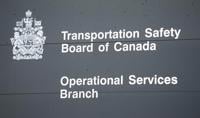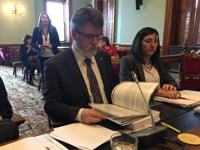NORTH PRESTON, N.S. - The commander of the RCMP in Nova Scotia delivered what he described as a long-overdue apology to the province's Black residents on Saturday, acknowledging that the force's past use of street checks did lasting harm to both individuals and communities.
Assistant commissioner Dennis Daley issued the apology to African Nova Scotians and all people of African descent during a Saturday afternoon event in North Preston, a predominantly Black community northeast of Halifax.
He said the RCMP had "disrespected" Black Nova Scotians through the practice of randomly stopping people and logging personal details about them and acknowledged the now banned practice — which disproportionately targeted young Black men — affected many facets of daily life.
"I'm sorry to you and your loved ones for how differently potential employers, your family and your community might have seen you, and even how you might have seen yourself, as a result of our actions," Daley said at a ceremony that was livestreamed to several locations throughout the province. "...I want to acknowledge and apologize for the far-reaching impacts of street checks."
The practice sometimes known as carding, which is now banned in Nova Scotia, involved police randomly stopping citizens to record their personal information and store it electronically.
A provincially commissioned study released in 2019 condemned the practice used by Halifax Regional Police and the province’s RCMP because it targeted young Black men and created a “disproportionate and negative” impact on African Nova Scotian communities.
The independent study, compiled by criminologist Scot Wortley, found Black citizens were five times more likely to be street-checked than white citizens. Another study found street checks were illegal in constitutional and common law.
Daley acknowledged findings by Wortley and others in Saturday's apology.
"All of your experiences are reinforced by data and evidence," he said. "... You've been speaking about your experiences for years. I am truly sorry it's taken so long for you to be heard."
In November 2019, then-Halifax police chief Daniel Kinsella issued a formal apology to the city’s Black community, acknowledging that police actions and words over the decades caused mistreatment and victimization.
Speaking nearly two years later, an RCMP spokesman said the police force had no plans to offer a similar apology, saying that even though the RCMP recognized the disproportionate harm caused to marginalized communities, the Mounties' national policy "still supports the use of street checks as a policing tool."
A national study prepared for the RCMP didn't recommend banning street checks but instead offered recommendations to change internal policy and require officers to obtain citizens' "informed consent" before going ahead with a check.
But advocates for the province's Black community made it clear they were not satisfied with the RCMP's position. And in September of last year, Daley said an apology was overdue — a sentiment he echoed on Saturday.
"This apology has taken far too long to reach you," he said. "And I recognize that without action, words are hollow."
To inform the apology and an accompanying five-part action plan, Daley formed a steering committee of African Nova Scotians from 13 Black communities across the province.
The action plan, which aims to improve relations between African Nova Scotians and the RCMP, will be implemented over three years. The plan focuses on increasing education about African Nova Scotian history and anti-Black racism, ensuring ongoing engagement with Black community leaders and increasing and retaining African Nova Scotians within the RCMP.
Other goals include collecting better race-based data to make better decisions within the force and reporting the plan’s progress to the Black community and the action plan’s steering committee.
Halifax youth poet laureate Asiah Sparks said the apology and action plan was a "step in the right direction," but told reporters it's important to remember that harm by the police has already been done.
The 19-year-old, who has close family ties to North Preston, said there was still a "long way to go" and the apology will be meaningless without any actions that follow.
During her address, Sparks said she felt "heavy" being in the presence of so many police officers, saying that after having several "unpleasant" interactions with police officers, being near them made her feel anxious.
"I've always been very proud of where I'm from and my lineage, but thinking about interactions with police, I've always felt hesitant to say where I'm from," she said.
"It's really layered. Street checks themselves have caused their harm. It's not just the violations, but also the humiliation...scars still run deep."
Jayreece Whiley, another young African Nova Scotian, said the apology set the tone for necessary action moving forward. Also a 19-year-old, Whiley said he felt emotional during the apology as a young Black man who has had negative experiences with police.
"It did touch me...when the consultations were held in my community, the amount of trauma that was there and the amount of people that were there and the amount of people that were impacted by this was quite profound," he told reporters.
Though he hasn't had the opportunity to read through the action plan, Whiley said he will be engaging with its progress and is hopeful for the future.
This report from Ďă¸ŰÁůşĎ˛ĘąŇĹĆ×ĘÁĎ was first published Sept. 7, 2024.








































